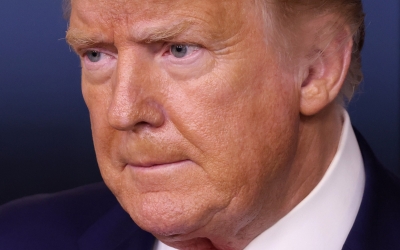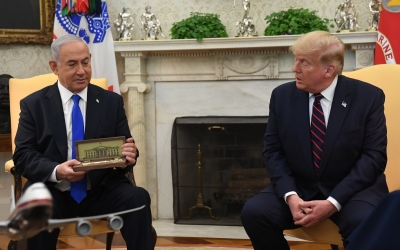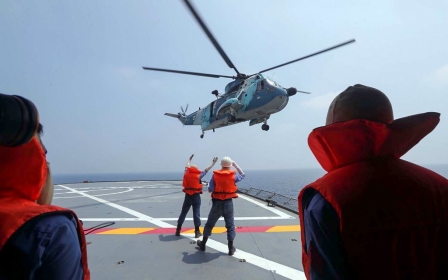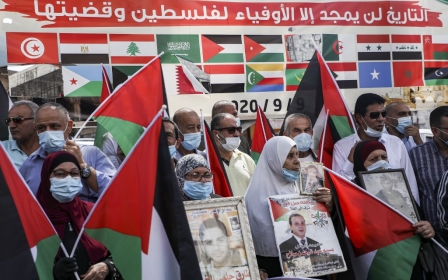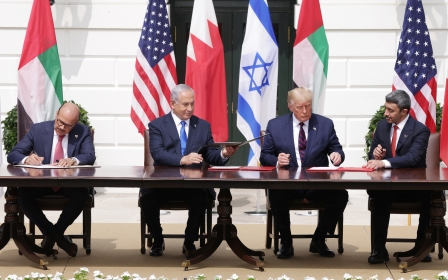UAE-Israel deal voices support for Trump's 'deal of the century'
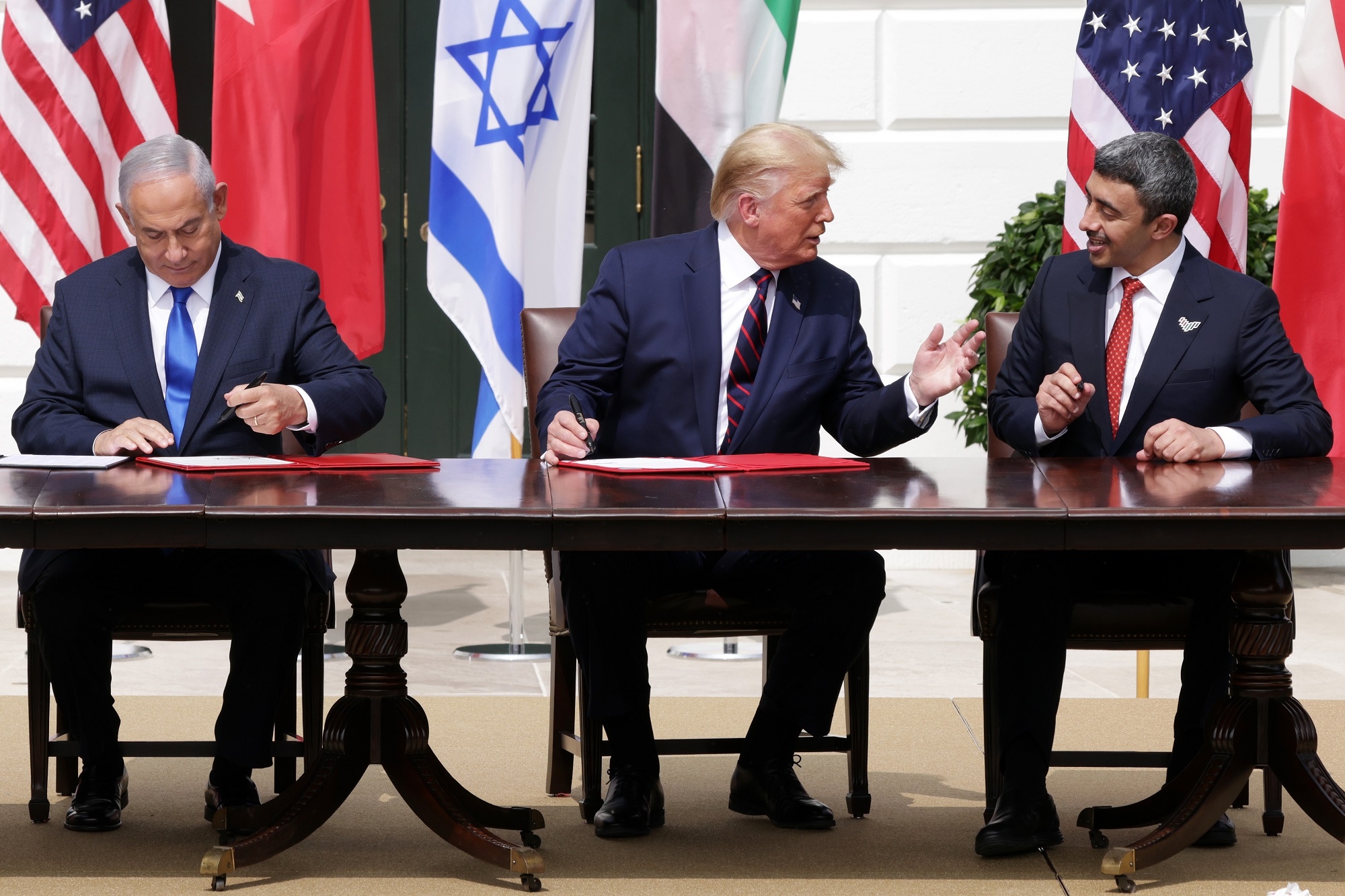
The normalisation agreement between the United Arab Emirates and Israel calls for a "comprehensive" and "realistic" solution to the conflict between Israelis and Palestinians, citing Donald Trump's so-called "deal of the century".
The deal, signed at a White House ceremony on Tuesday, says the two countries will exchange embassies, ensure regular direct flights between their airports, and embark on economic and technological cooperation in the name of regional stability and prosperity.
Bahrain also signed a normalisation deal with Israel at the same ceremony.
Although Palestinian leadership has been absent from the normalisation deal, the accord mentions Israeli-Palestinian relations in its preamble - but within the context of Trump's scheme to end the conflict, which was forcefully rejected by the Palestinian Authority.
The governments of the UAE and Israel agreed to normalisation "recalling the reception held on 28 January 2020, at which President Trump presented his Vision of Peace and committing to continuing their effort to achieve a just, comprehensive, realistic and enduring solution to the Israeli Palestinian conflict," the accord reads.
New MEE newsletter: Jerusalem Dispatch
Sign up to get the latest insights and analysis on Israel-Palestine, alongside Turkey Unpacked and other MEE newsletters
'Deal of the century'
The 28 January reception refers to Trump unveiling the full "deal of the century" - the US administration's long anticipated plan that was dubbed by critics as "dead on arrival", as Palestinians refused to engage with it.
The scheme, brokered by White House adviser and Trump's son-in-law Jared Kushner, would allow Israel to keep all of its West Bank settlements and annex the Jordan Valley - both illegal under international law - in exchange for establishing a disjointed Palestinian state with no control over its borders or airspace.
"I think it's nonsense. It's an attempt by the UAE's PR advisors to play to Trump's ego," said Khalil Jahshan, executive director of the Arab Center Washington DC. "That's what this whole agreement is about. It has nothing to do with peace in the Middle East or a solution to the Palestine problem. It's essentially an expression of support for Trump."
Bahrain's accord with Israel contains a similar reference in calling for a solution to the Israeli-Palestinian conflict, but it does not mention Trump's "deal of the century", according to a copy of the agreement published by Haaretz.
Neither agreement mentions the two-state solution. Moreover, the UAE deal does not mention anything about Abu Dhabi's quest to acquire advanced weapons from Washington.
UAE officials had expressed hopes that formalising relations with Israel would allow them to purchase F-35 fighter jets from the United States despite the US policy of maintaining Israel's military superiority in the region.
According to US and Israeli media reports, Israeli Prime Minister Benjamin Netanyahu had initially given the green light to the F-35 sales but reversed his position after facing a backlash from political opponents at home.
Speaking to Fox News on Tuesday, Trump backed the F-35 sale, praising Abu Dhabi's Crown Prince and de facto ruler Mohammed bin Zayed, also known as MBZ.
"I know the leader very well, Mohammed, I would have no problem in selling them the F-35," he said.
Jahshan said while the accord props up Netanyahu and Trump - who are facing their own domestic issues - it also feeds into the UAE's urge to act like a superpower in the region by cosying up to the White House "despite the failures in Yemen and Libya and other places".
He said MBZ gets some of the most expensive advice in the world from lobbying and PR firms that work for him in Washington.
"This is the only way to communicate with Trump: play his game. Praise Him. Quote his plan from January. And you can play chess with the man just like Netanyahu does," Jahshan said.
No reference to Jerusalem
Unlike the deal's announcement in August, the UAE-Israel accord makes no reference to the holy sites in Jerusalem.
"As set forth in the Vision for Peace, all Muslims who come in peace may visit and pray at the Al-Aqsa Mosque, and Jerusalem’s other holy sites should remain open for peaceful worshippers of all faiths," the August statement said.
The passage raised fears that the deal aimed to challenge the status quo of Christian and Muslim holy sites in Jerusalem, which are under Jordanian custodianship and managed by the Islamic Waqf.
Israel acknowledged Jordanian custodianship of the holy sites in occupied East Jerusalem in its 1994 peace treaty with Amman. According to the status quo arrangement, Jewish Israelis are not allowed to worship at Al-Aqsa.
The mosque, which is the third holiest site in Islam, has been the flashpoint of major events and clashes. Israeli settlers often try to storm the Islamic holy site. The second Palestinian Intifada started in September 2000 when the late Israeli politician Ariel Sharon visited the Al-Aqsa compound, known to Jews as the Temple Mount.
Some Jews believe that the Temple Mount, which also houses the Dome of the Rock, was the site where the First and Second Jewish Temple once stood. That belief has long raised fears of a plan to rebuild the temple in place of the Islamic holy sites.
On Tuesday, Trump said the Israeli deal with the UAE and Bahrain puts an end to the "lie" that Al-Aqsa is under attack. The deal, dubbed the "Abraham Accord" by the US administration, stresses religious and ancestral links between Arabs and Jews.
And although many Arabs were, in fact, Jewish throughout history, the UAE deal stresses that Arabs and Jews "are descendants of a common ancestor", the prophet Abraham.
Jahshan noted that Abraham is believed to be buried in the West Bank city of Hebron, where Palestinians live in "arbitrary and discriminatory restrictions" that constitute "collective punishment", according to Amnesty International.
"It is basically a propaganda tool to mislead people," Jahshan told MEE. "Wrapping a disgusting arrangement like this with the name of Abraham makes Abraham roll in his grave."
Middle East Eye delivers independent and unrivalled coverage and analysis of the Middle East, North Africa and beyond. To learn more about republishing this content and the associated fees, please fill out this form. More about MEE can be found here.


